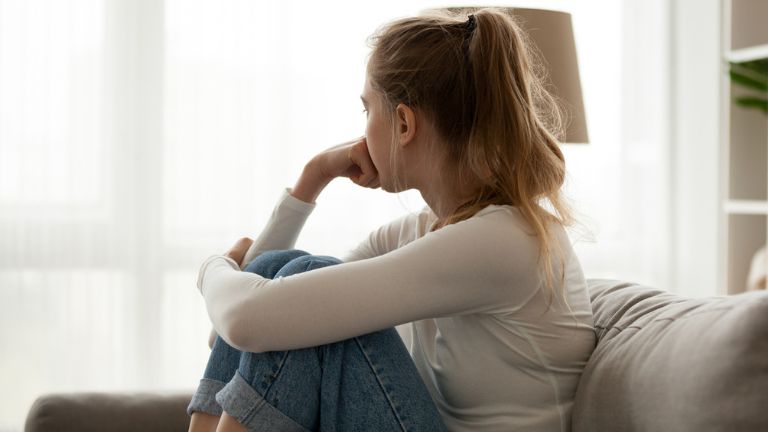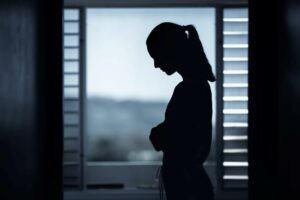For Mental Health Awareness Week, we speak to the experts who reveal the key signs of loneliness and what practical advice can help if you’re struggling
By Jane Collins
It is perfectly possible to be surrounded by a loving partner, crowds of friends, colleagues and family and still feel completely lonely.
Equally you can be very happily on your own often and not feel any sense of isolation at all.
three million adults in England feel lonely often or always
And while everyone feels lonely at some point in their life, when does it tip over into a problem and what can you do about it?
Official government statistics published last year shockingly reveal that around three million adults in England feel lonely often or always. Women are also more likely to admit to this than men.
What is causing so many of us to feel cut off from others?
‘There are many causes of loneliness including bereavement, relationship breakdown, experiencing discrimination, having highly demanding caring roles, retiring, changing jobs, moving home and starting a new school or university,’ says Dr Meg Arroll Psychologist and Healthspan Ambassador.
people who are more socially connected are healthier and better able to cope
Feelings of loneliness were also, unsurprisingly, compounded by COVID lockdowns when we were all pretty much denied physical contact with friends and extended family for over two years and many of us are still dealing with the fall-out from this.
What the pandemic also highlighted is that loneliness levels were not simply a problem for the elderly. In fact loneliness has been recorded to be higher among groups for whom the fall-out from losing physical social connectedness was immense. These include:
- young people,
- the unemployed,
- those on low incomes,
- people estranged from family,
- those with mobility issues,
- people who live alone,
- students and,
- single parents.
The estimated 1.7 million currently suffering with the effects of Long COVID (again something that affects more women than men) are also unlikely to have the energy to get out and socialise.
Of course, loneliness was an issue long before COVID – hence initiatives like ‘social prescribing’ where GPs and health workers could refer patients to services in their local area like gardening groups and art classes – putting lonely or vulnerable people in touch with others and making them feel part of a community.
we need meaningful connections with others and without them our physical and psychological health can suffer
The fact is that research shows us people who are more socially connected are healthier and better able to cope with and recover from a crisis or setback.
As fundamentally social creatures, we need meaningful connections with others and without them our physical and psychological health can suffer – research suggests loneliness is as much a threat to our health as smoking and being obese.
It is also linked to an increased risk of high blood pressure, coronary heart disease, cognitive decline, dementia and stress, depression and even suicide.
6 subtle signs you might be lonely
Loneliness sign #1 You have problems sleeping. Research suggests people who feel socially isolated tend to have fragmented sleep compared to those who feel more connected to others.
Loneliness sign #2 You are tired and often have muscle aches and pains. Research shows loneliness is associated with an increased incidence of pain, fatigue and depression.
Loneliness sign #3 You are prone to ‘comfort shop’. A study carried out over six years has shown lonely people are more likely to ‘fill a void’ by shelling out on more and more material possessions.
Loneliness sign #4 A tendency to spend your free time binge watching. A study has found a link between binge watching and loneliness.
Loneliness sign #5 Feeling increasingly stressed. Loneliness can raise levels of the stress hormone cortisol and also your blood pressure.
Loneliness sign #6 Spending ages on social media. One US study has shown those who spend over two hours a day on social media platforms were twice as likely to feel lonely than those who spent 30 minutes or less on them.
Is loneliness a mental health problem?
Feeling lonely isn’t a mental health problem in itself but the two things are often inextricably linked.
‘The general feeling of disconnect from others can turn into symptoms like anxiety, social anxiety, depression, insomnia, low self-worth and a heightened stress response,’ explains Dr Arroll.
Loneliness and Depression
Research shows loneliness is linked to depression and depression by its very nature makes the sufferer want to withdraw and isolate from others.
It’s a chicken and egg scenario and it is not always easy to recognise where one ends and the other begins.
You might notice you have no energy or motivation, have brain fog, are eating more or less than usual, have trouble sleeping or are sleeping too much and/or are suffering with muscle and joint aches and pains.
Depression can also be so debilitating that it affects a person’s interest in any social interaction. It can also make a person feel worthless, boring, guilty and like no-one would want to spend any time with them anyway.
You might notice you have no energy or motivation, have brain fog, are eating more or less than usual
Fixating on these thoughts can then lead into more self-isolating behaviour like turning down invitations, or if you do hook up with others, constantly worrying what they think about you.
‘Thinking patterns such as ‘I can’t do this’ leave us feeling frustrated and unable to move forward,’ explains Dr Arroll.
‘Try shifting your mindset to help break the cycle. Challenge these thoughts and have confidence in your ability to connect and bond with others.
‘Also, be kinder to yourself. We’re often our own harshest critic, so approach yourself as you would a friend in need, with compassion and patience.
approach yourself as you would a friend in need, with compassion and patience
‘If your symptoms don’t improve after a week or two see your GP and ask to be referred for a talking therapy such as Cognitive Behavioural Therapy (CBT) – this will help break maladaptive patterns that may be contributing to isolation and loneliness’.
Physically, if your depression is decreasing your appetite or you are just not eating well, help take care of yourself by taking a daily multivitamin and mineral supplement which includes vitamin B12 and Zinc (like Healthspan’s Multivitality Gold) – low levels of which have been linked to depression.
Alternatively, have a powdered mineral drink like A. Vogel Balance, which includes zinc, magnesium and vitamin D to cover any nutritional shortfall of a decreased appetite.
Loneliness and Eating Disorders
Loneliness also plays a significant role in those living with an eating disorder (ED) which by their very nature are illnesses of disconnection.
‘An eating disorder thrives on isolation, actively keeping people at a distance,’ says Kerrie Jones, CEO and Founder of Orri Eating Disorder Treatment Centre.
‘We often find that people have very few close friends or intimate relationships as their eating disorder forms a seemingly ‘protective’ barrier between them and the outside world.’
Those struggling with an ED often report problems connecting with others, struggling to make friends and thinking people don’t like them.
People who binge eat, compulsively overeat or are bulimic often talk about food being their ‘friend’. They want to be alone with food – they do not want others to see them bingeing. Then afterwards they can feel guilty and repulsed by what they have done leading to feelings that no-one could ever want to be around them.
Those struggling with an ED often report problems connecting with others
Those with anorexia are often so consumed by their ‘food rules’ and restrictions (plus an often compulsive exercise habit) they have little headspace to think about anything else. They can also be thrown into a blind panic by someone asking them out to eat and so they decline and eventually people stop asking.
Not feeling comfortable around others in the presence of food can also often lead to avoiding important social events like birthday parties, Christmas dinner, weddings or any get together.
But it isn’t just those actively battling an eating disorder who experience isolation and loneliness.
being secretive and unwilling to open up about their condition leads to difficult family relationships and friendships
Family and friends often say they have ‘lost’ a loved one to an ED because the social isolation is such a huge part of the condition. ‘Hiding’ in the bathroom or bedroom, being secretive and unwilling to open up about their condition leads to difficult family relationships and friendships.
Significantly, one important element of ED recovery is learning how to turn to people.
‘A way of overcoming the barrier of an eating disorder is to allow yourself to have relationships and give yourself permission to authentically enjoy them,’ explains Kerrie Jones.
‘There’s no right or wrong way to have the friendships and relationships you want – as long as they are true to you. The process may come easily or it may take time. Either way, be kind to yourself.’
Dr Arroll also suggests these practical steps you can take to stop loneliness adversely affecting your health…
Step 1: Don’t binge drink or watch
If you’re alone and feeling lonely try to avoid alcohol and drugs or too much time binge watching. These activities are all linked to increased feelings of loneliness.
Step 2: Cut down on social media
It stands to reason if you are on social media you are not physically connecting in the real world plus seeing people you know on Instagram at an event you haven’t been invited to, for example, can raise levels of stress and anxiety.
Investing in maintaining your friendships, prioritising time with family and friends and generally making a concerted effort to connect with people in person is so vital.
Step 3: Attend to your physical needs
Try to go for a daily ten minute walk which should help you sleep better and try to eat a well-balanced diet – all of which should make you better able to cope with stress and negative thinking.
Step 4: Stop comparing yourself to others or even to yourself
It’s not only other people on social media surrounded by happy family and crowds of friends that can make us feel lonely – scrolling through old posts of ourselves can also result in a negative current self-image as we look through rose-tinted glasses at the past.
Step 5: Natural stress relief
Other simple ways you can look after yourself include keeping a stress-reliever like A.Vogel’s Passiflor Complex Spray, £10.99 to hand.
This contains extracts of calming Passion Flower and lemon balm, along with cell-protective zinc and you can use it whenever you feel stressed.
If you are experiencing loneliness-related anxiety a CBD supplement might help as research shows CBD oil has anxiolytic (anti-anxiety) effects.
Healthspan CBD Support: Mellow, £37.95 also contains magnesium, zinc and B vitamins which are known to help support psychological health.
For further help:
MIND – offers more practical tips to help manage loneliness and where to go for support
The Campaign to End Loneliness – work to help anyone experiencing loneliness
NHS – provides online tools to help if you are finding it hard to cope with stress, anxiety and depression caused by loneliness
Beat – supporting all types of eating disorders and to find treatment try Orri who provides online and a day care treatment programme
More Healthista Content:
3 ways to reduce stress in 24 hours
Hay fever season: 5 proven ways to reduce symptoms
Food synergy – 9 healthy recipes with food combinations guaranteed to super-boost your health
Jillian Michaels reveals how you can make the most of your workouts EVERY time
TV Doctor Michael Mosley reveals why ketosis is the ultimate short-term weight loss tool
Like this article? Sign up to our newsletter to get more articles like this delivered straight to your inbox.

























































